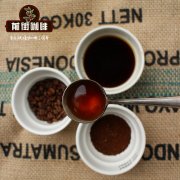Does Arabica Coffee Bean taste good? handmade single Coffee Bean correct method Flavor and Taste characteristics

Professional coffee knowledge exchange more coffee bean information please follow the coffee workshop (Wechat official account cafe_style)
Qianjie-Arabica variety introduction
Arabica coffee began to spread around the world in the mid-1700s. Historically, most coffee is descended from Typica and Bourbon. In the mid-20th century, breeders began to introduce "infiltration" varieties resistant to "coffee leaf rust".
There are dozens of varieties of Arabica coffee widely grown around the world, each with unique performance and adaptation to local conditions. although there are several types of coffee beans, Arabica coffee is considered to have the best quality coffee beans. Today, Arabica coffee is still the most popular coffee bean in the world and accounts for about 70% of the world's coffee production.
Arabica coffee plants do not like the harsh climate and like to grow at temperatures between 15 °C and 24 °C in the shade, usually at an altitude of 1900 + feet (more than 600 meters).
Arabica plants grow well in tropical climates near the equator, which is why Costa Rica, Ethiopia, Brazil, Colombia, Guatemala, Ecuador, Mexico and Burundi can find the best coffee and high-quality Arabica coffee beans, among which Brazil is considered to be the largest producer of Arabica coffee in the world.
Arabica coffee taste
Arabica coffee has a mild taste, and based on ordinary coffee drinkers, they describe coffee beans as slightly sweet, high-quality Arabica coffee with a hint of chocolate, nuts and caramel, however. The taste of coffee beans will be affected by the baking time or time, so Arabica coffee taste is also a little acidity and slightly bitter, in addition, the beans growing area and soil will also affect the flavor harmony of coffee beans.
Knowledge: Robusta is planted below 800 meters above sea level. Robusta has strong adaptability and strong resistance to diseases and insect pests.
In short: Qianjie is a coffee research hall, happy to share the knowledge about coffee with you, we share unreservedly just to make more friends fall in love with coffee, and there will be three low-discount coffee activities every month. The reason is that Qianjie wants to make more friends drink the best coffee at the lowest price, which has been Qianjie's tenet for 6 years!
END
Important Notice :
前街咖啡 FrontStreet Coffee has moved to new addredd:
FrontStreet Coffee Address: 315,Donghua East Road,GuangZhou
Tel:020 38364473
- Prev

Are arabica coffee beans American black coffee? where does Arabica coffee beans come from?
Professional coffee knowledge exchange more coffee bean information please follow the coffee workshop (Wechat official account cafe_style) front street-Arabica varieties introduce coffee produced in Africa, the flavor is very diverse, the span of flavor spectrum may be the first in the world. Different kinds of coffee not only have their own advantages, but also have their own flavors.
- Next

How about Arabica coffee beans? the petite girls of Arabica coffee beans
Professional coffee knowledge exchange more coffee bean information please pay attention to the coffee workshop (Wechat official account cafe_style) front street-Arabica variety introduction in many media advertising, often appear 100% Arabica such words, which also led to a lot of onlookers who do not know the truth, think that Arabica = high-quality coffee, which has become a difference between many coffee practitioners over the years
Related
- Beginners will see the "Coffee pull flower" guide!
- What is the difference between ice blog purified milk and ordinary milk coffee?
- Why is the Philippines the largest producer of crops in Liberia?
- For coffee extraction, should the fine powder be retained?
- How does extracted espresso fill pressed powder? How much strength does it take to press the powder?
- How to make jasmine cold extract coffee? Is the jasmine + latte good?
- Will this little toy really make the coffee taste better? How does Lily Drip affect coffee extraction?
- Will the action of slapping the filter cup also affect coffee extraction?
- What's the difference between powder-to-water ratio and powder-to-liquid ratio?
- What is the Ethiopian local species? What does it have to do with Heirloom native species?

